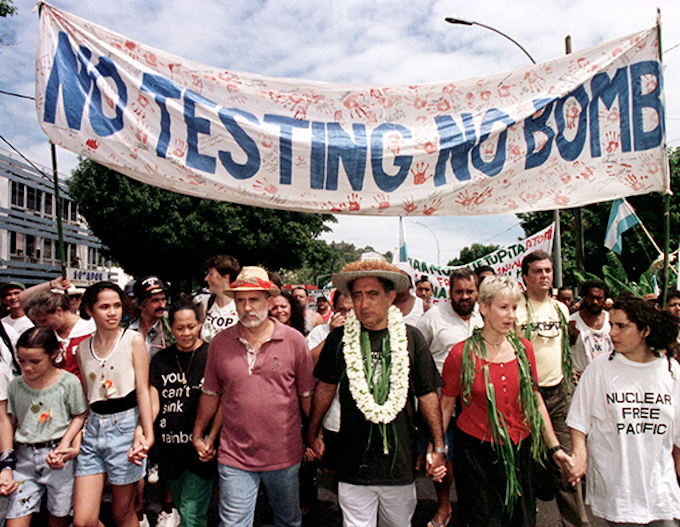
SPECIAL REPORT: By Ena Manuireva and Tony Fala
On 27 May 2021, a significant event took place in Rwanda where French President Emmanuel Macron asked for forgiveness from the people of Rwanda after admitting for the first time that France bore a “terrible responsibility” for the deaths of hundreds of thousands in the 1994 genocide.
This is how President Macron’s wording appeared in The Guardian:
“France played its part and bears the political responsibility for the events in Rwanda. France is obligated to face history and admit that it caused suffering to the Rwandan people by allowing itself lengthy silences at the truth exam …”
On the other hand, the French government assumes no liability for the genocide and ecocide perpetrated in Mā’ohi Nui (French Polynesia)- the “crown jewel” of France’s overseas territories.
- READ MORE: Macron hosts French ‘truth and justice’ Pacific nuclear test legacy talks
- Other French nuclear tests reports
The French administration is living in denial concerning its responsibility to the Ma’ohi Nui people vis-a-vis the impact of nuclear tests in the region.
Former French President Hollande said in 2016 that: “I recognise that the nuclear tests between 1966 and 1996 in French Polynesia have had an environmental impact, causing health consequences.”
Further, Hollande added that the issue of compensation for health consequences would be examined — but that statement fell flat as a series of empty promises. That speech has no political or compensatory weight since every five years the reset button is activated during the French presidential elections.
Promises turn stale
Promises made by politicians usually turn stale unless they are seeking another electoral mandate.
France projects an image of itself as a responsible nation in the world at large — but France has treated the issues concerning Rwanda and Ma’ohi Nui differently.
The Rwanda population received a confession of guilt whereas the Ma’ohi Nui populations have received a slap in the face.
Mā’ohi Nui is still waiting an admission of guilt from the French administration — especially after the publication of the investigative book Toxic that discredited all the French governments’ discourse concerning “safe and clean” nuclear tests.
The French government refuses to tell the truth concerning the harm successive administrations have committed upon Ma’ohi Nui.
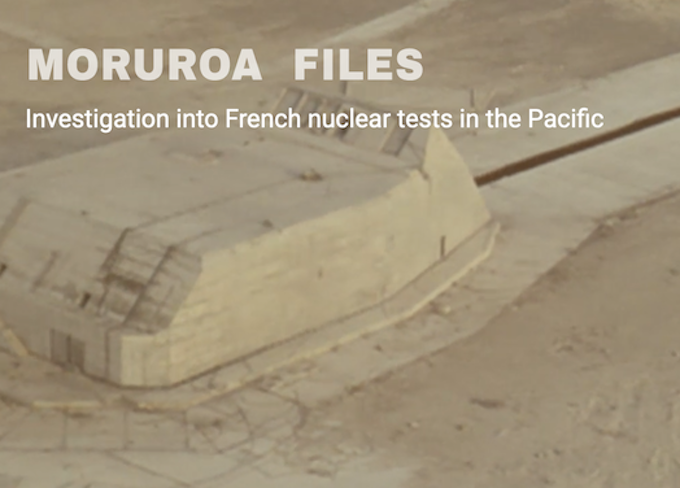
Ma’ohi Nui standing up in protest
The release of the book Toxic has injected a renewed energy among civil and political groups in Mā’ohi Nui who are reminding the French state that discussions concerning accountability are long overdue. The book focused on the degree to which the radioactive fallout from an atmospheric nuclear test named Centaur contaminated nearly the entirety of the Mā’ohi Nui Islands.
France has used the local Ma’ohi Nui population as guinea pigs to advance its national ambition of becoming a nuclear power while ignoring the rights of the local population and their environment.
Marches in commemoration of the more than 100,000 Ma’ohi Nui people affected by the radioactive cloud from the Centaur explosion will take place in the streets of Pape’ete in Tahiti, on July 17 — the very date when Centaur exploded in 1974.
Marches in Pape’ete are also a response to the stand taken by French President Macron. The French leader has organised a meeting this week when, once more, discussions concerning the modality of potential compensation are taking place along with new rules to be drafted for victims of radioactivity.
However, instead of holding the meeting in Mā’ohi Nui, where most of the contamination has occurred, the meeting is being held in the colonial capital of Paris. Locating the meeting in Paris appears to be yet another way for the French administration to try to control the narrative surrounding the Centaur blast.
Faa’a mayor Oscar Temaru, a former French Polynedsia territorial president, is under no illusion that most of the participants attending the Paris meeting will be pro-French, including Tahiti’s current government which has responded positively to the invitation.
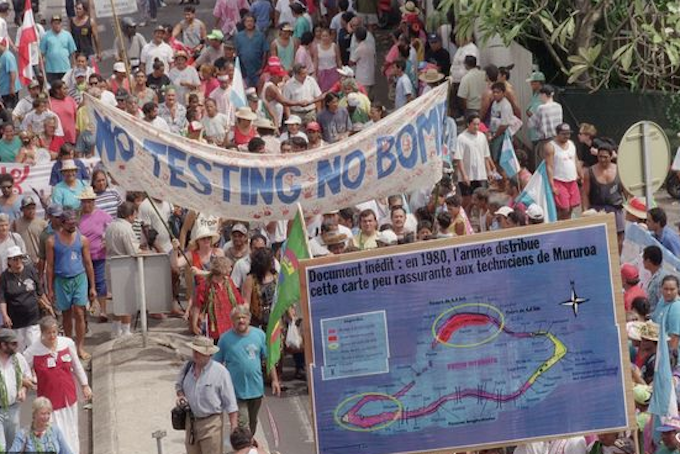
The main anti-nuclear Mā’ohi parties have rejected the invitation from Paris for France’s lack of transparency concerning process, and because these parties believe France’s capital is an inappropriate venue for discussing the horrendous nuclear tests that took place in Mā’ohi Nui.
Total transparency
Temaru says that the way to demonstrate total transparency would be to call upon a neutral arbitrator such as the United Nations to mediate between the French government and Mā’ohi Nui representatives.
Temaru asks for this despite knowing well that the French practise a policy of the “empty chair” at the UN. The International Court of Justice in the Hague would be another appropriate place to discuss decolonisation: especially since Macron said in 2017 that colonisation was a crime against humanity.
According to Temaru, pro-French representatives of the local Tahitian government are trying to undermine the resolution of 2013 that reinscribed French Polynesia onto the UN list of non-self-governing territories. These Tahitian representatives are asking for the 2013 resolution to be overturned: that is very unlikely to happen.
In consequence, Oscar Temaru and his people are organising a day of action for July 17 in Pape’ete, Tahiti. They will march in commemoration of the day the 1974 Centaur nuclear test was initiated — for reparation for damage caused to the Ma’ohi Nui environment and people as a result of nuclear testing, and for the decolonisation of Ma’ohi Nui.
Temaru has invited Moana peoples to stand beside him in solidarity. Nuclear capability is the colonial weapon par excellence and this issue cannot be separated from indigenous peoples’ rights to self-determination.
Organisers in Aotearoa have responded to Temaru’s call and have organised a rally to take place in Auckland on July 18 at the same time as protests occur in Tahiti.
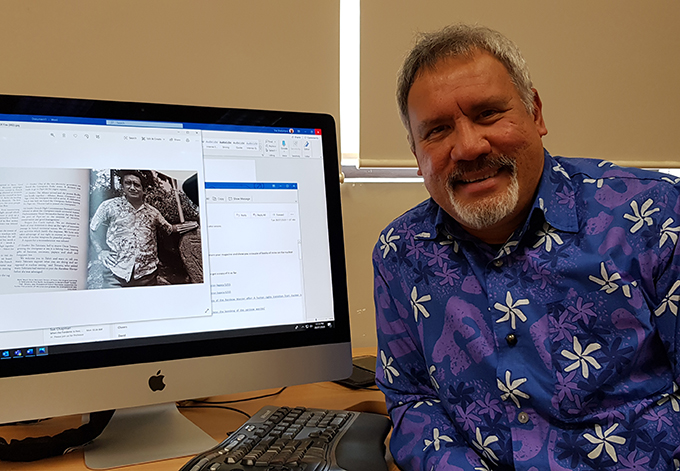
Organising the diaspora around Ma’ohi Nui protest
Members of the Tahitian community living in Auckland will add their voices and feet to support their countrymen/women in Tahiti and rally in a show of solidarity on Sunday, July 18. This rally acknowledges that Ma’ohi Nui communities have fought for redress from France over the nuclear issue for long decades.
Rally organisers seek the active support of communities and civil society groups committed to the rights of the Ma’ohi Nui people in their fight against colonialism and neo-colonialism. The Auckland gathering recognises the suffering of other smaller communities in the Pacific in the face of ecological and political colonialism.
The action for Ma’ohi Nui in Auckland will be a cross-generational endeavour aiming to bring together young activists with more experienced ones-so that the new generation can work alongside those who have gone before.
Organisers recognise they stand upon the shoulders of Māori, Pacific, and Pakeha giants who have fought for nuclear justice for Moana peoples in years gone by. The consequences of nuclear testing in the Pacific are intergenerational.
This rally seeks to bring together all the Pacific people (and all other supporters) who live by the Moana-Nui-a-Hiva. Nuclear testing, climate change, and deep-sea mining all imperil our ocean. We must respond to these threats collectively as peoples of the “Sea of Islands”.
The Ma’ohi Nui peoples’ struggle for their rights concerning nuclear issues is an Oceanic issue.
The rally will send a strong message to the French administration that people will not rest until there are concrete efforts made by the French colonial power in Mā’ohi Nui to:
• Recognise responsibility for the 30 years of nuclear testing
• Compensate the whole of Mā’ohi Nui who have carried the sanitary cost of contamination
• Repatriate the unstable nuclear waste buried under the atolls of Moruroa and Fangataufa
• Clean up both atolls
• Start the process of de-colonisation as stated in the 2013 resolution of the UN Charter
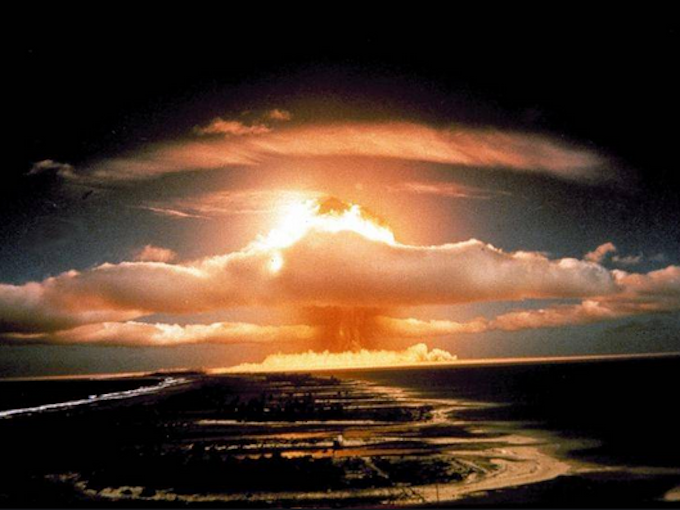
Auckland rally plans
The Auckland rally for Mā’ohi Nui has two components. Firstly, we will gather in the “Elizabeth Yates” room at the Ellen Melville Centre to watch live video of the Tahitian day of action in Pape’ete. Oscar Temaru will address his people in Tahiti and those gathered in Auckland.
Secondly, we will go to nearby Bernard Freyberg Square where there will be poems, songs, and speeches given in honour of Mā’ohi Nui and her struggle for reparations and decolonisation.
In this work, organisers are guided by the wisdom of assassinated Kanak leader Jean-Marie Tjibaou:
“The Pacific, with its ocean and its islands, is a gift of the gods to the peoples of Oceania, past and present. The ocean, the islands, the air and the light, the fish, the birds, the plants and mankind together comprise the Life which is our supreme heritage as Pacific people. Everyone is responsible for his own fulfilment.”
“This responsibility is becoming more and more difficult to exercise as the dangers assume ever greater dimensions:
• The danger of denial of the indigenous peoples and their heritage;
• The danger of denial of the greatest dignity of all: control of one’s
life and destiny;
• The danger of blind industrialisation smothering the earth with
tar and concrete;
• The danger of tentacular multinationals which suck the substance;
of our countries to nourish other bellies and other minds…; and
• the danger of nuclear weapons.”
Ena Manuireva is a Mangarevian originally from the south of “French” Polynesia who has lived in New Zealand for many years and is currently a doctoral studies candidate in Te Ara Poutama at Auckland University of Technology. According to family genealogies, Tony Fala has ancestors from multiple Moana islands including Aotearoa, Samoa, Tokelau, and Tonga. He is an activist, volunteer community worker, and volunteer project researcher and writer completing a small Moana academic, activist, and community education project. Both Manuireva and Fala contribute articles for Asia Pacific Report. They are organising the Auckland solidarity rally.
Speakers TBA:
18 July 2021 rally programme TBA.
Rally on Facebook Events page, Mai te Paura Atomi, i te Tiamara’a/ From Bomb Contamination to self- determination.
Organisers:
Ena Manuireva (Ma’ohi Nui lead organiser). Email: jmanuireva@gmail.com Cellphone: 02102575958
Tony Fala (support organiser). Email: tony_fala@yahoo.com Cellphone: 0220129381










































